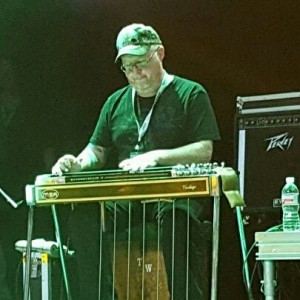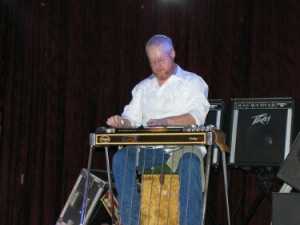
Terry White playing the steel guitar.
Terry White was no stranger to back pain. Six years ago, Terry suffered a series of torn discs in his L4-L5 and L5-S1 levels. The injury to his lower back caused severe nerve pain that extended into his legs which lead to a constant limp while he walked. He had pain while he was standing, sitting and even sleeping. Within the last two to three years, the severity of the pain increased to a point where he was missing work one to two days a week. The pain completely took over his life.
Terry tried injections, physical therapy and pain medications to help alleviate his back pain, and nothing gave him permanent relief. He would experience slight relief from the pain injections, but nothing that would last longer than a few days. Close to going on permanent disability, Terry decided to have spinal fusion surgery. He said, “I thought this was my chance to finally be pain free.”
Four days before surgery, Terry’s insurance precertification was denied and the surgery was cancelled. Completely devastated, Terry truly felt like he had run out of options and would be resigned to living the rest of his life in constant pain.
Terry was referred to Dr. Phillips at OPTIMAL Pain & Regenerative Medicine® a few days after he received the news about his surgery. “What I appreciated the most about Dr. Phillips’ style of care was that he was very straight forward with me. He knew my history with other conservative treatments, and he told me about a new procedure called hematopoietic progenitor (HPC) stem cell therapy (also called Bone Marrow Aspirate Concentrate cell therapy or BMAC). At this point I was willing to try anything, and I felt like I had nothing to lose,” he said.
On August 7, 2015, Terry had bone marrow aspirate concentrate (BMAC) progenitor stem cell procedure performed on his L4-L5 and L5-S1 discs. During this procedure, Dr. Phillips removed bone marrow from Terry’s pelvis and put his bone marrow through a centrifuge that separated the hematopoietic progenitor stem cells. Dr. Phillips then injected the HPC stem cells into the torn spinal discs.
Dr. Phillips told Terry that he was going to be in a lot of pain following the procedure, and he was right; but just a few days later, Terry started noticing a decrease in his pain level. He took two weeks off work to recover from the procedure and said, “I was thankful that the recovery time was short compared to the time I would have had to take off following spinal fusion surgery.”
Terry started to see improvements in his symptoms. During week three, he really noticed an improvement. The walk to his work was a quarter mile and while he was walking to work, he stopped and realized that he was no longer limping. He thought it was a miracle! At the four-week mark, he was completely pain free.
 It will be a year in August since he had the procedure, and Terry feels like he has his life back! He is back to playing the steel guitar, which he stopped playing a few years ago because of the pain.
It will be a year in August since he had the procedure, and Terry feels like he has his life back! He is back to playing the steel guitar, which he stopped playing a few years ago because of the pain.
Terry has this advice for other patients, “For those who are going through a similar experience as I was before the procedure, I would recommend going in for a consultation with Dr. Phillips. The HPC stem cell injections may not be the right procedure for you, but it is definitely worth going in for a consultation to see if it can alleviate your pain.”
While clinical studies support the effectiveness of these procedures, individual results may vary. There are no guarantees of outcome. All surgeries involve the risk of major complications. Before you decide on surgery, discuss treatment options with your doctor. Understanding the risks of each treatment can help you make the best decision for your individual situation. Always ask your doctor about all treatment options, as well as their risks and benefits. Only your doctor can determine the appropriate treatment for your situation. The clinical information and opinions, including any inaccuracies expressed in this material by patients or doctor are not necessarily those of OPTIMAL Pain & Regenerative Medicine® and should not be considered as substitute for medical advice provided by your doctor.